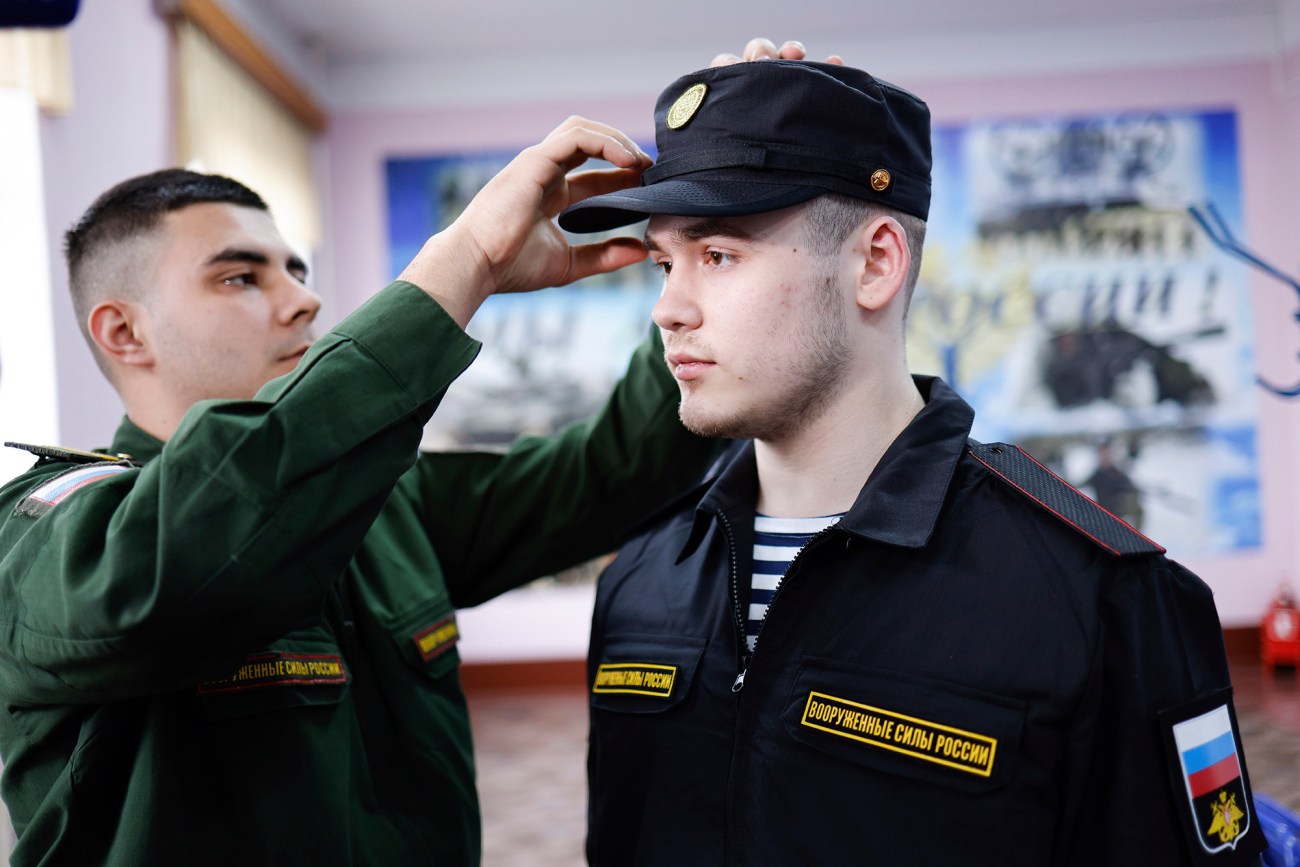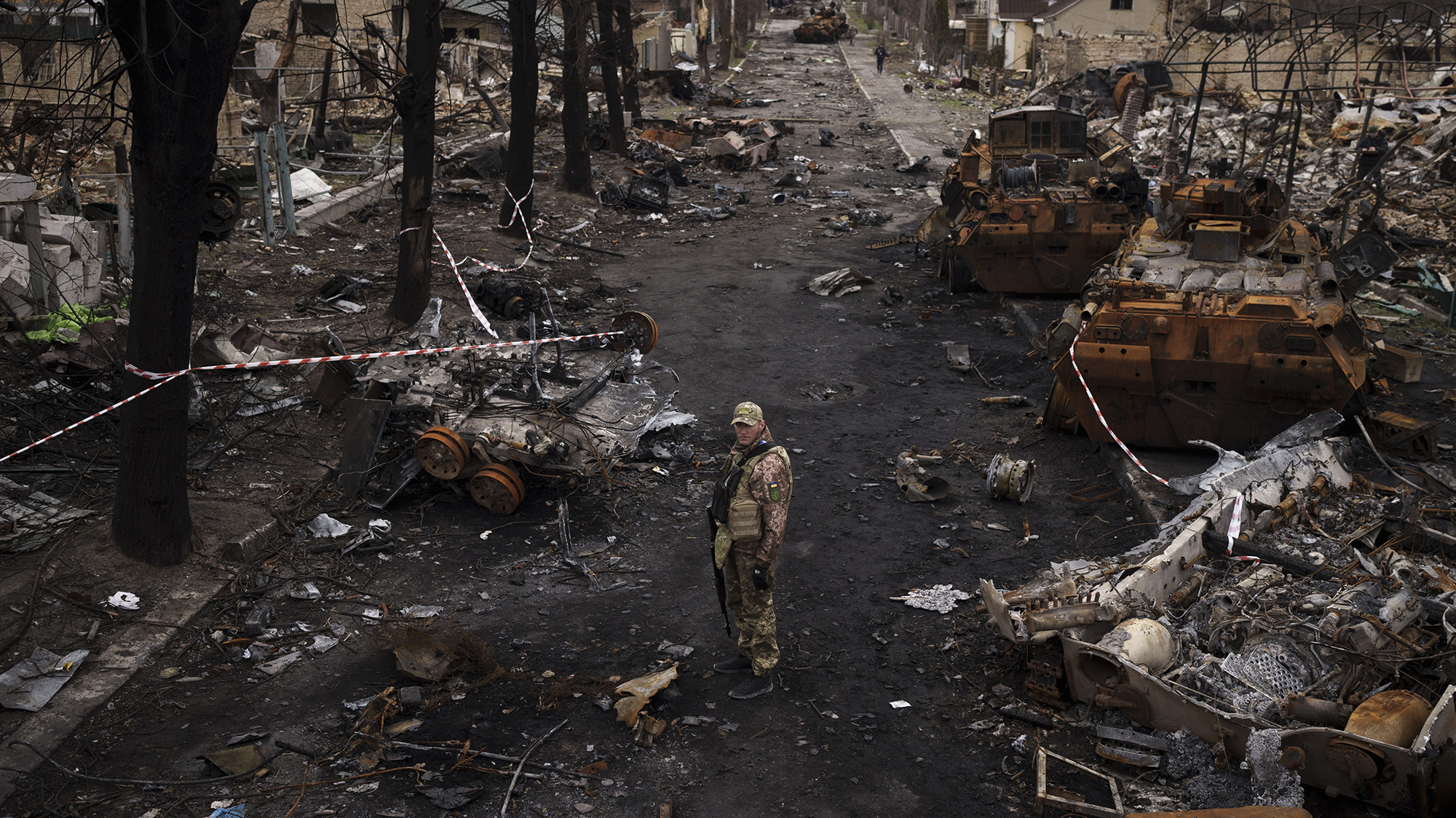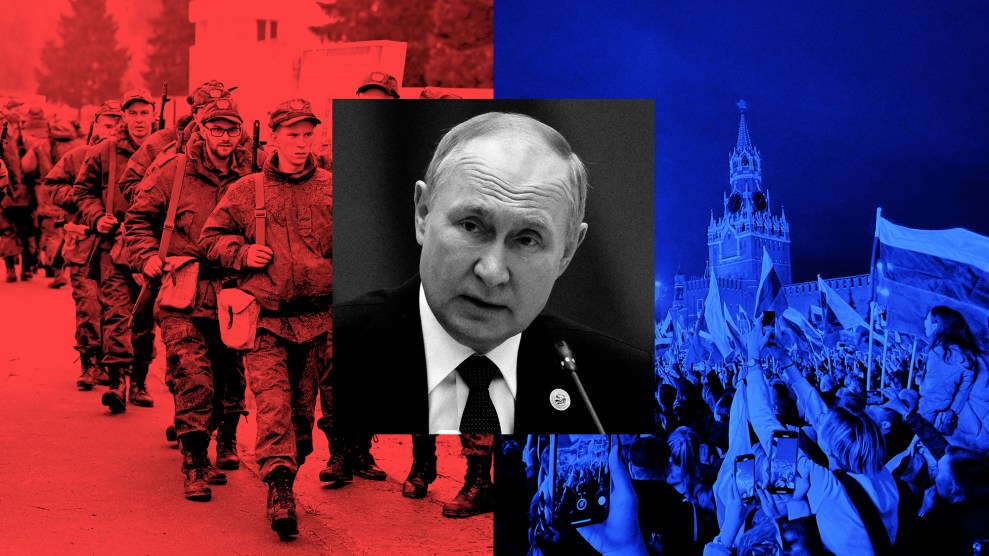A version of this essay originally appeared in the London Review of Books.
The “Special Military Operation” (the law forbids calling it anything else) got off to a bad start—Russian armed forces crossed into Ukraine and found themselves stuck in the mud, low on fuel and provisions, surrounded by a hostile civilian population. Then it slogged along in an apparently ceaseless meat grinder for the next calendar year.
But many people in Russia support it. While countless men fled the country when mobilization was ordered, others willingly reported to draft offices, boarded the busses, and headed to the front, seen off by their women and children. The federal government first promised the mobilized men 300,000 rubles for signing up, then rescinded the offer and instructed regional governments to support their families instead. Governors gave what they could: cash and cabbage, flour, and firewood. Packs of frozen dumplings. In Tuva, families of the mobilized were provided with one live sheep. Friends, family, volunteer organizations, religious organizations, and members of the public were asked to help out. And they did, chipping in to scrounge up what the mobilized needed: sleeping bags and combat boots, first aid kits and bullet-proof vests, underwear, and socks. Images of patriotic old women selflessly knitting socks for the boys at the front peppered the public imagination.
Some of those who had been mobilized soon found themselves locked in at training camps without adequate food, reliant on families to feed them through the camps’ chainlink fences. “Like animals at a zoo!” laughed the Ukrainian bloggers. The widely shared feeling here in Russia was that the mobilization drive was an ass-backward affair. Wives petitioned state authorities about the whole mess: they complained about local officials and demanded that the process be better organized.
Mobilized men posted video statements online entreating anyone who would listen. “We’re near Belgorod right now,” said a man in one viral video, “there’s about 500 of us here, we’re all armed but no one’s been assigned to a regiment. We’ve spent a week living like animals, and we don’t know where we’re going. We’ve had to buy food with our own money. We’ve got weapons but they’re not registered to us.” The video was published by a patriotic telegram channel with over a million subscribers. These men, the channel’s editors explain, “are burning with desire, they want to defend their homeland, but they don’t understand what is happening. We’ve said this before: this is the fault of systemic problems in the Ministry of Defense.”
The Special Military Operation is a bloody fiasco—that much is obvious. Terms like “the Bakhmut meat grinder” are now idiomatic. And yet it’s a fiasco that the people support. Anglo-American commentators turn to familiar totalitarian tropes to explain this curious fact: they write that Russians are brainwashed, depoliticized, and terrified of police repression. Historians trace the roots of this situation in the long durée. Ekaterina Pravilova, a historian of Imperial Russia, notes that today as in the 19th century those who are allowed to speak on behalf of society are closely linked to the state,
“[M]ost of the millions of people who support Putin and his plans of imperial revival…have been raised on state propaganda and are unwilling to question the veracity of the myths that it produces. They are excited about military victories because different ideas have never been inculcated in their minds, neither by the schools nor by the Orthodox Church. Many of them live in misery and abandonment, and they seek emotional comfort not in kindness and compassion but in an illusionary victory in a ‘special operation.’”
But while such tropes are comforting, they cannot explain why people support this Special Military Operation at the same time that they openly criticize its leadership, methods, and goals. Online and in daily life, in formal state petitions and in viral streams, people in Russia complain about political and military leaders’ criminally incompetent actions and policies. They denounce the military’s infrastructure, tactics, and strategies. The most patriotic speak the most critically.
Consider the story of Igor Girkin, AKA Strelkov. Tried in absentia by the International Criminal Court for shooting down the 2014 Malaysian Airliner while leading an insurrection in the breakaway Ukrainian republic he christened “Novorossiya,” Girkin is now safely set up in Moscow, far from both the frontline fighting and from the international court. And from this safe position deep inside the Russian State, Girkin speaks critically about…the Russian State!

A Russian army conscript receives a uniform at a military enlistment office in Kaliningrad, Russia. On March 30, Russian President Vladimir Putin signed a decree setting out the routine spring conscription campaign, calling 147,000 citizens up for statutory military service.
Mikhail Golenkov/Sputnik/AP
Among his recent statements, he has said that all members of the Russian military presently fighting on Ukrainian soil are guilty of war crimes because the Special Military Operation is not a declared war. He has said that the incompetence of this Special Military Operation has made people all over the world lose their fear of the Russian military. He has said that Putin uses a stand-in when he meets with civilians because the real Putin never lets anybody get near him.
Girkin openly vlogs about things that I would be afraid to say loudly in public, especially under the new laws about “Discrediting the Russian Armed Forces.” Other people are served prison sentences for saying much less. A woman from Barnaul recently wrote in a local telegram channel that the Russian Armed Forces bombed the Mariupol theatre in which civilians were sheltering. For this comment, she has been punished with six years in prison. Meanwhile, Girkin’s main telegram channel has 800,000 subscribers. He is a frequent guest on other channels. People listen to him, cite him, and bring him up in everyday conversation. He gives them the terms in which to criticize the state and its military. And yet here he is, safe on the home front in Moscow and not even in hiding.
Girkin is not alone. An active online public of military bloggers rabidly criticizes state leaders and policies, calling for more war, more imperialism, and more violence. Holding the legal order in certain disdain, the mil-bloggers lend their patriotic support to the image of a Russian-Soviet empire, glorified not least for its gritty soulfulness, and its illiberal collectivist values. “Let the people handle this!” the mil bloggers say to the old army generals. “Leave it to the mavericks.”
When such public personas cross certain indefinite lines, when they know too much or simply get in the way, then they might be removed—by their own proposed methods. This is likely what happened to Maxim Fomin (AKA Vladlen Tatarsky), best known for vlogging from the Kremlin’s celebratory ceremony of annexing Ukrainian land: “We will hold victory over everyone. We will kill everyone. We will rob everyone who should be robbed. Everything’s going to be just as we like it.” On April 2, 2023, Fomin was killed at a public event in a restaurant belonging to Yevgeny Prigozhin, the leader of the state-affiliated private mercenary enterprise known as the Wagner Group. He accepted a golden bust of himself from a woman he had previously met at Listva, a Girkin-affiliated book store. This golden bust turned out to be a bomb, which exploded the moment Fomin bent over it. The blast was loud, and then it was over. By the following morning, a suspect had been apprehended. Newspapers disclosed the entire story of her perfect crime, blow by blow—almost as if the Investigative Committee had had a draft statement ready. Fomin got a hero’s funeral. Russian media blamed Ukraine and called for retaliation.
This is the riddle: People support the Special Military Operation even while they criticize it. They criticize it because they support it, and the more they criticize the more they support. When asked why it’s necessary, supporters typically bring up two reasons. The first is that the Motherland is in danger. Here, discussions of NATO advancements slide easily into the themes of linguistic chauvinism and culture-war social claims: the Motherland is an amorphous concept, more about language and social relations than national borders and laws. The second reason is that we can’t let our guys down, we’re in this together. More than simply the natural reaction of people helping each other get by in hard times, this sentiment is central to the state’s propaganda. It is the philosopher’s stone of its populist claims.
So as the officially stated aims of the Special Military Operation keep changing—to cleanse Ukraine of Naziism, to protect Russia from NATO, to protect Russian speakers from linguistic oppression, and to fight Satanism—its official slogan remains the same: svoikh ne broasem, we do not abandon our own!












